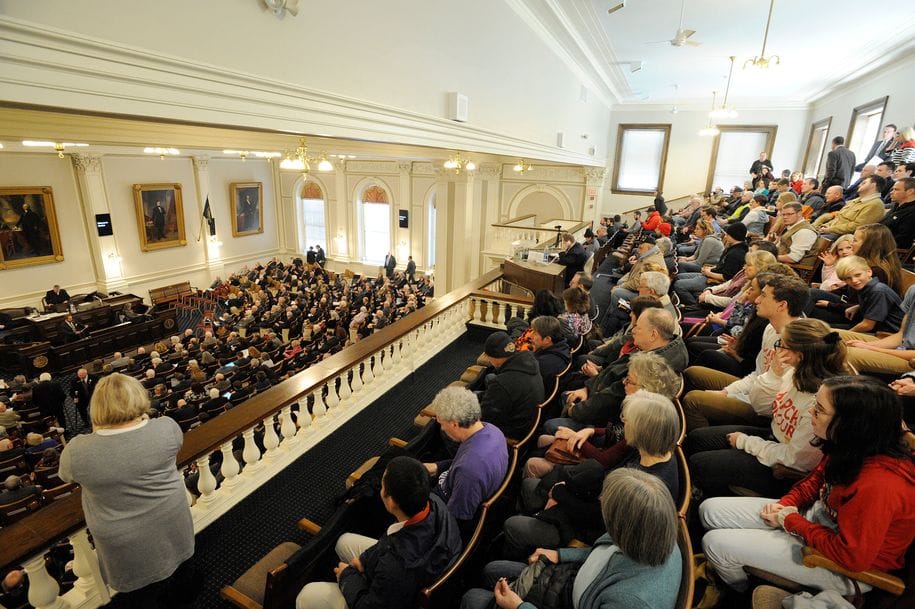Doing the people’s work: The New Hampshire General Court
It is often said that decisions are made by those who show up. I believe this to be true. Many have opinions on how things should get done and what laws should be passed, but people often say that their voices are not heard or that their vote doesn’t matter.

O P I N I O N
MY THOUGHTS EXACTLY
By Brian Chicoine


It is often said that decisions are made by those who show up. I believe this to be true. Many have opinions on how things should get done and what laws should be passed, but people often say that their voices are not heard or that their vote doesn’t matter.
I do not believe those statements, and in fact, if you are blessed enough to live here in New Hampshire, it simply is not true. Elected officials in New Hampshire are extremely accessible, and most council and legislative meetings are open to the public. Even on the state level, one can testify about a bill or contact their representative(s), who generally live near them.
New Hampshire has a very transparent government, and one where citizen involvement is easy. New Hampshire is not perfect, (no state is), but one can be as involved in the legislative process as they want to be.
This legislative session, which began back in January, has a number of bills that could lead to some significant changes in the way that we educate our children as well as fund our public schools. In addition, we have bail reform fixes and of course the biennial budget.
Of course, I will be posting about many of these bills on my blog, My Thoughts Exactly, or discussing the bills on my upcoming podcast, (which will be posted to my YouTube channel as well as to my other socials).
For now though, I’d like to explore just how straight forward it is to get a bill through the New Hampshire legislature and how the body does the work of the People in the House of the People, (which is our State House).

Overview of the New Hampshire General Court
The New Hampshire General Court is the legislative body of the state and is composed of two chambers: the House of Representatives and the Senate. The New Hampshire General Court is the second largest legislature in the United States following the U.S. Congress. It is said that only the U.S. Congress and the English and Indian Parliaments are larger.
The New Hampshire House of Representatives
The New Hampshire House of Representatives is the larger of the two chambers in the General Court. It consists of 400 members, who are elected from 204 House districts. The House of Representatives has a broad and diverse composition, which allows it to represent New Hampshire’s population at a grassroots level.
Each district is designed to reflect roughly equal representation in terms of population. Representatives serve two-year terms, with no term limits, allowing them to remain in office for as long as they continue to be re-elected by their constituents.
The House is responsible for introducing most bills related to the state’s budget, revenue generation, taxation, and other essential functions of the state government. It is often the starting point for most legislative activity. The House also has the power to initiate impeachment proceedings against state officials, and it must approve proposed amendments to the state constitution.

The New Hampshire Senate
The New Hampshire Senate, the smaller of the two chambers, consists of 24 members, each representing a district of approximately 55,000 people, (24 Senate districts). Like the House of Representatives, members of the Senate serve two-year terms, with no term limits.
The Senate is often tasked with approving or rejecting nominations made by the Governor, and it also has the authority to propose amendments to the state constitution, though these amendments require approval from both chambers.
Leadership and Organization
Both chambers of the New Hampshire General Court have leadership roles that help guide the legislative process. The Speaker of the House is elected by the House of Representatives, while the President of the Senate is chosen by members of the Senate. These leaders oversee the legislative proceedings and serve as liaisons between the chambers, ensuring that legislation is debated and voted on in an orderly manner.
Both chambers also have standing committees that focus on specific areas of policy, such as education, health, and public safety. These committees help to review proposed legislation, hold hearings, and make recommendations on whether bills should move forward to the full House or Senate for debate.
How a Bill Becomes a Law in New Hampshire
The process by which a bill becomes a law in New Hampshire is relatively straightforward, but it involves several steps to ensure that proposed laws are carefully considered before being enacted. This process can be broken down into the following stages:
1. Introduction of the Bill
A bill can be introduced by any member of the General Court—whether in the House of Representatives or the Senate. The bill is formally written and sponsored by a legislator, and it is then assigned a number for identification purposes. Once introduced, the bill is typically referred to a relevant committee for review. In New Hampshire, committees play a crucial role in determining the fate of bills, as they conduct initial reviews, hold public hearings, and make recommendations on whether the bill should proceed.
2. Committee Review
After being introduced, the bill is referred to a committee that specializes in the subject matter of the proposed legislation. For example, a bill addressing education issues would likely be sent to the House Education Committee or the Senate Education Committee.
During the committee review process, the bill is examined in detail, and public testimony is often invited. The committee may hold hearings where experts, advocacy groups, and the general public can weigh in on the bill’s merits or drawbacks.
After the committee review, the bill is voted on and sent back to the full body as “Ought to pass,” “Ought to pass as amended,” “Inexpedient to legislate,” “Refer to interim study,” or “Re-refer to Committee.” (Re-refer to committee shall be a committee report only in the first year session; Refer to interim study shall be a committee report only in the second year session). This report reflects the majority decision of those at the committee deliberation. Committee members can only give a recommendation, the full body must take action.
*I also want to note that “Inexpedient to legislate” in New Hampshire is the same as “do not pass.”
3. Floor Debate and Voting
Once a bill passes through the committee stage, it returns to the full chamber—either the House of Representatives or the Senate—for debate. Legislators discuss the bill’s provisions, amendments, and potential impact. During this debate, lawmakers may propose amendments to the bill, which could alter its content.
After the debate, the bill is put to a vote. In the New Hampshire House of Representatives, voting is done by voice vote, with members calling out “yea” or “nay,” although a roll call vote can be requested. In the Senate, voting is typically done via a roll call, where each senator’s vote is recorded.
If the bill passes in one chamber, it moves to the other chamber, where the process is repeated. (For example, If the bill originated in the House, it will go to the Senate, and vice versa).
4. Consideration by the Other Chamber
Once a bill is approved by one chamber, it is sent to the other chamber for consideration. The second chamber can approve, amend, or reject the bill. If the second chamber makes amendments to the bill, it is sent back to the first chamber for agreement. If the two chambers cannot agree on the final version of the bill, it may be sent to a conference committee, which is composed of members from both chambers and works to reach a compromise.
5. Governor’s Approval
Once both chambers have approved the same version of the bill, it is sent to the Governor for final approval. The Governor has three options:
- Sign the bill into law: If the Governor signs the bill, it becomes law.
- Veto the bill: If the Governor vetoes the bill, it is returned to the General Court. The General Court can override the veto with a two-thirds majority vote in both chambers, allowing the bill to become law despite the Governor’s objection.
- Do nothing:
– If the Governor does nothing within five days (excluding Sundays and holidays), and the legislature is still in session, then the bill automatically becomes law without the Governor’s signature.
– If the Governor does nothing within five days (excluding Sundays and holidays), and the legislature has adjourned, then the bill dies, (known as a “pocket veto”).
6. Bill Becomes Law
Once the Governor signs the bill or the veto is overridden, the bill becomes law and is codified into the New Hampshire Statutes. It takes effect at the time specified in the bill or immediately upon passage if no date is specified.

Citizen Legislature in New Hampshire: Advantages and Disadvantages
One of the most unique features of the New Hampshire General Court is its status as a “citizen legislature.” Unlike most states, where lawmakers are full-time professionals, members of the New Hampshire General Court serve in a part-time capacity. This structure presents both advantages and disadvantages.
Advantages of a Citizen Legislature
- Greater Public Access and Accountability: A citizen legislature is more closely tied to the communities it represents. Legislators typically hold other jobs in addition to serving in the General Court, meaning they are in touch with the daily challenges faced by their constituents. This can lead to more informed decision-making that reflects the needs of the public.
- Low Cost: New Hampshire’s citizen legislature operates at a fraction of the cost of full-time legislatures in other states. (Legislative salaries in New Hampshire are $200 per two-year term. [Because of their added duties, the Speaker of the House and the Senate President receive $250 per term]). This keeps taxpayer costs down and makes the legislative process more efficient.
- Encourages a Diverse Pool of Legislators: Because serving as a legislator in New Hampshire does not require a full-time commitment, it is more accessible to a broader range of individuals. People from various professions, backgrounds, and walks of life can serve, which enhances the diversity of perspectives within the legislature.
- Prevents Career Politicians: The citizen legislature model limits the potential for the rise of career politicians. Since legislators are not dependent on their positions for a livelihood, they may be more likely to focus on serving the public good rather than seeking re-election as their primary goal.
5. No “Back Room Deals:” Every bill that is proposed receives a Floor Vote.
Disadvantages of a Citizen Legislature
- Limited Time and Expertise: Because legislators are part-time and often juggle other responsibilities, they may not have enough time to deeply understand every issue they vote on. This can lead to less effective lawmaking, particularly on complex or specialized issues. However, it should be noted that people and resources are available so that each legislator has a full understanding of any given bill.
- Less Professional Guidance: Unlike full-time legislatures, New Hampshire’s citizen legislature lacks the professional staff and institutional knowledge that might be found in other states. This can lead to inefficiencies and delays in the legislative process, as new legislators may need time to familiarize themselves with the inner workings of the General Court.
- Difficulty in Handling Complex Issues: Some issues require long-term commitment and a detailed understanding of complex systems, such as the state budget or education reform. Given the part-time nature of the General Court, legislators may not have the capacity to fully engage with these complex issues, leading to less comprehensive solutions. However, as mentioned earlier, resources are available to increase legislator understanding.
Conclusion
The New Hampshire General Court is a unique legislative body that operates on the principle of a citizen legislature. With a structure that includes the House of Representatives and the Senate, the General Court provides the people of New Hampshire with the ability to have their voices heard throughout the lawmaking process. The process by which a bill becomes law is relatively straightforward, with several stages of debate, review, and approval. It is a very transparent process.
While the citizen legislature model has its advantages, such as greater public access, lower costs, and a diverse pool of legislators, it also comes with challenges, including limited time and expertise, and less professional guidance in the legislative process. Despite these drawbacks, the citizen legislature in New Hampshire remains a fundamental part of the state’s governance, offering a distinctive approach to representative democracy.
Our State House is open for all to enjoy so go and visit. It is a great place to learn about New Hampshire history and learn how laws are made in our great state. If you’re there during a House or Senate session, (generally at 10AM on Thursdays), sit-in and watch from one of the galleries. Or, you can stream a House session live at home by clicking here. You can also view Senate sessions by clicking here. The NH House calendar can be found here, and the NH Senate calendar can be found here. (You can subscribe to them if you wish).
If you want to find your State Representative(s), click here, to find your State Senator, click here. To look up legislation, click here.
Let’s get involved and keep our State Reps and State Senators accountable!
Comments can be sent to me directly at mythoughts603@gmail.com.





